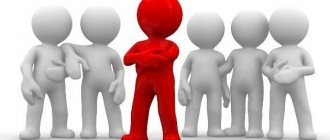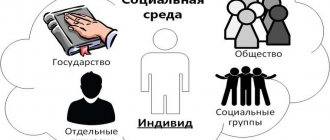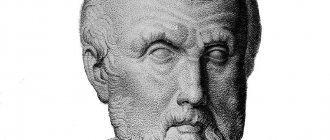Personality, individual, individuality - these concepts are often used as synonyms. And we, without hesitation, replace one with the other, and not only in relation to an adult or any representative of the biological species Homo sapiens. The word “personality” can be heard in a young mother’s story about her newborn baby, and even in the owner’s reasoning about her cat or dog.
In fact, this is too loose a treatment of serious psychological concepts. They are not synonyms and, despite the fact that each of these words denotes a set of human qualities, there are significant differences between them.
The individual as a representative of the human species
The human community is made up of individuals. That is, we can use this word to call any representative of Homo sapiens, regardless of age, race, level of mental development, state of health or position in society.
In relation to a representative of an animal community, the concept “individual” is usually used. Sometimes a person is called that, but in this case this term sounds with a tinge of disdain, or even as an outright insult.
So, an individual is a representative of people as biological beings, and his characteristics also have a biological nature. These include the following:
- genotype – a set of innate characteristics of genes that creates conditions for the unique development of an organism;
- phenotype - a set of characteristics of an organism that are the result of the interaction of the genotype with the environment;
- the integrity of the biological and physiological structure of the body and its resistance to environmental influences.
By the way, the difference between an individual (human) and an individual (animal) lies precisely in biological - genotypic and phenotypic characteristics. Neither speech, nor consciousness, nor work activity or upright posture are characteristics of an individual. Although they are unique to humans, they are not biologically given, but are formed in the process of human development under the influence of society.
Therefore, we can include in the category of “individual” newborn babies who cannot speak or walk, and mentally disabled, and deaf-mute, and even those in a coma. A person is born an individual and remains one until death, regardless of the conditions of existence.
The essence of the concepts “man” and “individual”
In Russian science, the concept of “man” has two meanings: broad and narrow. In the first of these, “man” is a category that refers to the entire human race. The concept characterizes the totality of people in their various differences from the animal world. In this situation, we can say that it is generic, that is, it applies to the entire human race.
Are you an expert in this subject area? We invite you to become the author of the Directory Working Conditions
In the first meaning, the concept characterizes humans both as a biological species and as a social being that differs from animals. In a narrow sense, the concept also denotes each individual person, but at the same time acts as a term that separates any person from the rest.
In the latter sense, the word consists of properties found in an individual person, and not of all the characteristics of people. Psychology identifies several concepts that reflect the spiritual world of a person, including his values, self-awareness and worldview.
An individual is a single representative of the human species. Individuals may differ from each other in morphological characteristics (for example, height, physique, eye color), as well as psychological properties (for example, abilities, temperament, emotionality).
An individual in relation to the concepts of personality and individuality is defined as:
- A single natural being, which is a product of phylogenetic and ontogenetic development in the unity of congenital and acquired principles;
- A bearer of personal, individual, peculiar traits and aspects;
- An individual representative of public life, a social being that goes beyond natural (biologically determined) limitations.
Finished works on a similar topic
Course work Correlation of the concepts individual, subject of activity, personality, individuality 440 ₽ Abstract Correlation of the concepts individual, subject of activity, personality, individuality 220 ₽ Examination Correlation of the concepts individual, subject of activity, personality, individuality 200 ₽
Receive completed work or specialist advice on your educational project Find out the cost
An important and special characteristic of an individual is represented by his ability to overcome inherent biological limitations, consciously managing his own behavioral activity with control of all the most important psychological processes.
Personality is a product of social relations
If an individual is born, then a person becomes a person in the process of interaction with the social environment. Some people receive the right to this “title” earlier, others later, but definitely at a conscious age, when the individual can independently make decisions and be responsible for their consequences.
If an individual is biologically given, then a personality cannot be formed outside of society; this requires a process of socialization.
Concept and characteristics of personality
The concept of personality evolved gradually. For a long time it meant the social role that a person played in society. And the more important this role was, the more significant the person was considered. It is not for nothing that the Russian word “personality” comes from the obsolete “mask” - mask. And the similar Latin term persona also originally meant a theatrical mask.
But nowadays the concept of “personality” is considered more broadly, although it still retains an assessment of the social significance of a person. Naturally, the question arises, who can we call a person? And somewhere in the depths of our souls there lives the confidence that he is definitely her. It’s not difficult to answer this question; it’s enough to “try on” three main personality characteristics:
- A personality is a social individual, that is, a person brought up in the traditions of a particular society, who has undergone socialization and learned the norms accepted in this society. Because of this, he can be considered a full-fledged and full-fledged member of society.
- A person is an independent and independent individual who independently makes decisions and is responsible for them to society.
- A personality is an active individual, that is, a person who takes part in the life of society, is part of its system and contributes to the development of social relations. By the way, participation in the physical reproduction of society (the birth and upbringing of children) is also such a contribution.
As you can see, the majority of fairly mature and capable people fall under the definition of “personality.” But children, at least until adolescence, do not. They are potential, developing personalities, but have not yet become them.
Another question arises: can one consider the personality of a criminal, a maniac, a person who started a war and destroys society? Yes, after all, he was also brought up within a certain culture and learned social norms, just not the same as you and me. He is also a product of social relations.
But dogs and cats, with all my love for them, are not individuals and will never become them. But another concept is quite applicable to them - individuality. I'll tell you about it later.
Personality structure
Personality is a complex formation that includes a number of components and levels. These components may even contradict each other, then the person experiences an intrapersonal conflict. There are various options for personality structure, and in our domestic psychology it includes the following groups of human qualities:
- individual psychological characteristics: temperament, character, abilities, etc.;
- motives that govern human behavior and value orientations, which also influence activities, attitudes towards the world and others;
- orientation: a set of views, ideological principles, beliefs, attitudes, interests, formed under the influence of society;
- experience: knowledge, abilities, skills acquired by a person in the process of upbringing and self-education, education and self-development.
Sometimes these components are also supplemented by social status and the roles that a person plays in society. But this, in my opinion, is an external manifestation of personality and has nothing to do with its internal structure.
The concept of individuality
The concept of individuality has entered into several scientific fields and is based on different components of the definition, respectively. From a biological perspective, this concept includes the uniqueness and originality of each individual within a species, and the species itself among other living beings. Biological characteristics of individuality include genetically transmitted parameters, such as appearance, life expectancy, age-related changes, intraspecific and feminine-masculine features of manifestation.
However, regarding the human being, it is worth considering individuality as a special unique form of being in society; this allows us to move away from an exclusively biological consideration of this concept, where everything is initially laid down by nature. Since it is impossible to consider only the uniqueness of the retina or fingerprints as individuality, it is necessary to take into account social qualities and the psychological aspect; uniqueness consists of unique combinations of biological and social.
Let's dwell on the psychological characteristics. A person’s individuality appears as a set of psychological categories: temperament, intelligence, character, habits and hobbies, communication and choice of activities, features of perceptual processes. However, simply having unique qualities is not enough to understand individuality; it is very important to pay attention to the type of unique relationships between these qualities.
In psychology, individuality is the analysis (qualitative and quantitative) of a person's unique characteristics. Individuality can manifest itself in one or several areas at the same time. The difference in the degree of development and predominance of any characteristics and qualities, together with different ways to use the stored data, gives rise to the uniqueness of each.
Man is not an isolated, separate being, but a member of a collective. An individual is individual when he prefers not to be limited by collective norms, but transforms them and his own personality in order to achieve a higher level of consciousness.
Individual personality traits are largely considered acquired, with the exception of those few characteristics that are characteristic of each individual. The dissimilarity of each person develops and is formed from several basic components. The first component is heredity. The biological property of a living organism in humans predetermines both external signs and behavioral reactions to certain types of events. The second component is the environment. This includes the culture in which a person was born and raised, norms of behavior, ideals, and values of this culture; family, where life scenarios, behavioral stereotypes, prejudices about people and phenomena originate; belonging to certain social groups. The third component is the characteristics of temperament, character, i.e. The very individuality of a person also has no small influence on the formation of further individuality.
Nowadays, the issue of erasing individuality with the help of the media is increasingly being raised, where reactions are standardized, the ability for active thinking and analysis is weakened, the variability of behavioral reactions is reduced, so everything is presented in a ready-made form, with priorities set and hints to the necessary conclusion. For people who have not formed their individuality (children, teenagers), this can lead to standardization of thinking and actions, lack of criticism and a stop in the formation of their own personality. When society imposes standards of behavior and response, it calls into question the formation of personality as such. There is a massification of consciousness, the disappearance of individuality, personal responsibility, and one’s own decisions.
A person with a formed individuality is a mature person who is quite independent, relies in decisions on his own opinion, independent of the majority, and whose motivational sphere is developed.
Individual behavior
A person as an individual can behave in different ways. There are features that reflect the behavior of a particular individual.
The type of behavior can be conscious or unconscious, regulated, change depending on circumstances or remain static. Behavior can be normal and deviant, that is, deviating from the norm.
Behavior can change due to acquiring new knowledge and skills.
Behavior cannot be spontaneous; it always has reasons and goals. An individual cannot always realize, understand and defend them.
Motivation is formed from behavior - the desire to satisfy one's needs. A goal arises in place of an unsatisfied or unrealized need. This forces the individual to act and understand why this is happening.
With the advent of computer technology, we started talking about virtual human behavior. It is often characterized by artificiality, pretense, and unreality.
Individual characteristics
Having enormous potential for self-development and development as an individual, every person, after birth, manifests himself in certain properties. This is called individual development.
In social science, the concept of “individual” is used to denote the specific characteristics of an individual person. Firstly, each subject has unique external characteristics, eye color and bodily constitution, that is, he acts as a single representative of the species homo sapiens. Secondly, psychological differences can be identified between individuals: emotionality, temperament, character. Thirdly, everyone has a set of specific abilities.
From the point of view of some experts, the fetus in the womb already develops a peripheral and central nervous system in the second month. At five months, the embryo acquires the ability to hear and distinguish sounds, and in the third trimester it can already experience emotions (get scared, react to affection, conversations). Scientists insist that it is in the last months of gestation that the child’s intellectual abilities and psycho-emotional background are formed.
Therefore, there is an opinion that the formation of an individual begins not after birth, but immediately at the birth of a new life. We can briefly highlight its characteristics:
- high level of social activity;
- environmental sustainability;
- psychophysical unity of the organism.
The concept of “individual” in psychology is distinguished from the term “individuality”. It means a set of properties and features that determine the uniqueness of the subject. It manifests itself not only in behavior, but also in the specifics of preferences and interests. Individuality is formed in the environment in which the subject grows and develops, his associations acquired at an early age, and the characteristics of his upbringing. Psychologists say that one is born as an individual, one becomes an individual, and individuality must be defended.
The result of the development of an individual is a personality that is considered as an exclusively social entity.
Theories of human origins
There is no definite answer to the question of the origin of man: opinions on this matter are divided, and everyone believes in their own version, convenient for understanding. Today there are three main theories of the emergence of people on planet Earth:
- Theological or divine - this option stems from religion (Christianity).
According to her teaching, the first people on earth were Adam and Eve, whom God created. More precisely, first he created the earth, natural elements and animals, then he got bored and God created Adam. The latter also felt lonely at some point and asked the creator to create him another person. This is how Eve appeared. Well, and then you know... They sinned and were expelled from Paradise, began to live their own lives and give birth to children. Therefore, these two are considered the parents of all humanity, and all people are considered brothers and sisters. - The paleovisit theory is no less fantastic.
According to it, once upon a time the Earth was visited by creatures from other planets and somehow left their mark here. Maybe out of absent-mindedness they forgot several of their brothers, they adapted and eventually populated the entire territory. Or maybe it was a planned action to see if someone would survive here or not. There is an opinion that aliens are watching us? They watch how a person lives and develops (but has recently degraded), they wait until we fully evolve in order to admit to us that people are just an experiment. - And last but not least - Darwin's theory. It says that the first life randomly arose in water in the form of microorganisms that evolved, evolved, and further evolved into monkeys.
The latter, in turn, are considered our close relatives, because, according to Darwin, homo sapiens came from them. The transformation of a monkey into an intelligent creature began the moment it picked up a stick - the first tool of labor - in order to reach a fruit hanging on a tree.In more scientific terms, evolution began thanks to work activities that developed mental abilities. Actions make you think, and therefore develop your brain.
conclusions
Personality is the most important among metapsychological categories. All basic categories are integrated into it, drawn to it: individual, image, action, motive, attitude, experience.
Personality is a basic category and the subject of study of personality psychology. Personality is a set of developed habits and preferences, mental attitude and tone, sociocultural experience and acquired knowledge, a set of psychophysical traits and characteristics of a person, his archetype that determines everyday behavior and connections with society and nature. Personality is also observed as manifestations of “behavioral masks” developed for different situations and social interaction groups. As a personality develops, it can remove not only character traits.
Man, as is obvious, is not a conglomerate of disparate characteristics, mental elements. In the practice of communication, people see in each other a more or less holistic image, which makes it possible to distinguish one subject from another by his not only external, but also internal appearance.
Social individual
A person does not immediately become a social individual. He is born a defenseless and helpless creature. The sociality of the individual is achieved at the expense of society. First, these are his parents and immediate relatives. Then this field expands (kindergarten, school, media, friends, teachers, neighbors).
The child acquires social skills of the society in which he develops. That is why different peoples differ in their views on life, traditions, and cultural trends. This separates a particular people from other nationalities.
How does socialization of an individual occur?
In order to socialize, it is important for a child to go through a number of steps:
- Socialization in the family. Parents, relatives or people replacing them tell the child how to behave correctly, what qualities he needs to have, and how to act in a given situation. Often, the socialization of an individual at the family level occurs in the form of imitation of others. An individual copies the behavior of adults and can absorb both positive qualities and those that are not.
- Socialization in children's educational institutions. Educational institutions include kindergartens, schools, clubs and additional education sections. These social institutions help a person learn to communicate and interact with other people. They give him new knowledge, introduce the individual to who success and failure are. It's a tougher environment. She is not as supportive of the individual as his parents and relatives.
- Socialization among peers. It is interaction with peers that makes a child more socialized. By communicating with them, the individual learns about those areas that he cannot discuss with his parents. This allows a person to develop, modify and adjust his own worldview.
What else do you think influences the socialization of an individual? Share your opinion in the comments.
The video talks about the socialization of an individual from the point of view of social science.








